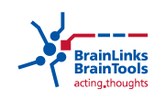Christian Meisel (National Institute of Mental Health, Bethesda, USA) | From neurons to networks: bifurcations, phase transitions and critical slowing down in neural systems
| When |
Mar 31, 2015
from 05:15 PM to 06:45 PM |
|---|---|
| Where | Lecture Hall, Hansastr. 9a |
| Contact Name | Stefan Rotter |
| Add event to calendar |
|
Abstract
The general idea that computational capabilities are maximized at or nearby critical states related to phase transitions or bifurcations led to the hypothesis that neural systems in the brain operate at or close to a critical state.
Near phase transitions, a system is expected to recover more slowly from small perturbations, a phenomenon called critical slowing, and observables typically exhibit power-law scaling relationships. In particular the dynamical systems‘ approach has provided a firm theoretical background on scaling laws of critical slowing down as a function of distance to a bifurcation and, consequently, how to determine whether a system is poised in the vicinity of a phase transition or not. In this talk I will discuss recent experimental work in neural systems, from individual neurons to networks of neurons, investigating these signatures of criticality. On the level of individual neurons two elementary modes of functioning can be observed: quiescence and spiking. Using the whole-cell patch clamp technique we observed the subthreshold membrane potential in neurons to exhibit critical slowing down near the onset of spiking. The associated scaling laws suggest a saddle-node bifurcation governing this transition in pyramidal neurons and fast-spiking interneurons.
When neurons connect to form networks, their individual bistability extends to the emergent network behavior. Here, the ability of individual neurons to homeostatically control their firing rates provides the mechanism for local self- organisation towards a critical network state. At the level of large neuronal ensembles we analyze patient data obtained from invasive EEG of epilepsy patients. Near the seizure onset we find oscillatory behavior and scaling laws of critical slowing down which substantiate the conjecture that a Hopf bifurcation could be involved governing the transition to seizure dynamics.
These findings indicate critical transitions to be relevant on different spatial and temporal scales and highlight their importance for the understanding of individual or collective neural dynamics.












